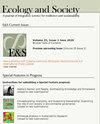用海平面上升互动小说游戏“Lagos2199”创造气候变化的未来
IF 3.2
2区 社会学
Q1 ECOLOGY
引用次数: 0
摘要
基于故事的未来在气候变化情景发展中发挥着重要作用。故事在探索海平面上升的可能性方面特别有用,因为我们知道许多沿海地区特别容易受到海平面加速上升的影响。海岸线的这种离散变化与大多数其他气候变化影响不同,并为科学知情的未来情景提供了明确的基础。2199年,我们在尼日利亚拉各斯举办了一场创造性的世界建设活动,以此来证明这一点。此外,我们采用基于故事的场景开发,并创建了一个以学习为导向的基于网络的游戏,允许用户以开放式、基于文本的冒险风格体验故事。这种合作过程融合了科学研究、故事讲述和艺术共同创作,迭代构建了游戏“Lagos2199”。本文记录了Lagos2199的第一个用例,以及来自学生用户的相应调查结果。这项工作有三个核心结论。首先,海平面上升将重新绘制地图这一独特现实可以作为未来世界建设和场景开发的切入点。其次,这样的场景可以与讲故事、艺术和音乐相结合,创造一个多维度、沉浸式的生态和社会变革探索。第三,这种游戏体验可以在气候变化教育中发挥重要的教学作用。让下一代公民流利地了解气候变化的影响以及社会将如何与这些影响互动,对于在未来几十年和几个世纪加速全球变化的过程中提供适应能力至关重要。本文章由计算机程序翻译,如有差异,请以英文原文为准。
Creating a climate changed future with the sea level rise interactive- fiction game ‘Lagos2199’
Story-based futures serve an important role in climate change scenario development. Stories are particularly useful in exploring sea level rise possibilities, since we know many coastal areas are specifically vulnerable to accelerating rises in sea level. This discrete change in coastline is different from most other climate change impacts, and offers a clear basis for scientifically-informed, future scenarios. We demonstrate this with a creative world-building effort set in Lagos, Nigeria, in the year 2199. Further, we employ story-based scenario development, and create a learning-oriented, web-based game that allows users to experience stories in an open-ended, text-based adventure style. This collaborative process blended scientific research, story-telling, and artistic co-creation to iteratively construct the game ‘Lagos2199’. The first use-case of Lagos2199 is documented herein, with corresponding survey results from the student users. This work has three core conclusions. First, the unique reality that sea level rise will literally re-draw maps can be leveraged as an entry-point for world-building and scenario development of the future. Second, such a scenario can be blended with storytelling, art, and music to create a multi-dimensional, immersive exploration of ecological and social change. Third, this kind of game experience can serve an important pedagogical role in climate change education. Providing the next generation of citizens with fluency in both climate change impacts and how society will interact with such impacts, is critical for providing adaptive capacity over the coming decades and centuries of accelerating global change.
求助全文
通过发布文献求助,成功后即可免费获取论文全文。
去求助
来源期刊

Ecology and Society
环境科学-生态学
CiteScore
6.20
自引率
4.90%
发文量
109
审稿时长
3 months
期刊介绍:
Ecology and Society is an electronic, peer-reviewed, multi-disciplinary journal devoted to the rapid dissemination of current research. Manuscript submission, peer review, and publication are all handled on the Internet. Software developed for the journal automates all clerical steps during peer review, facilitates a double-blind peer review process, and allows authors and editors to follow the progress of peer review on the Internet. As articles are accepted, they are published in an "Issue in Progress." At four month intervals the Issue-in-Progress is declared a New Issue, and subscribers receive the Table of Contents of the issue via email. Our turn-around time (submission to publication) averages around 350 days.
We encourage publication of special features. Special features are comprised of a set of manuscripts that address a single theme, and include an introductory and summary manuscript. The individual contributions are published in regular issues, and the special feature manuscripts are linked through a table of contents and announced on the journal''s main page.
The journal seeks papers that are novel, integrative and written in a way that is accessible to a wide audience that includes an array of disciplines from the natural sciences, social sciences, and the humanities concerned with the relationship between society and the life-supporting ecosystems on which human wellbeing ultimately depends.
 求助内容:
求助内容: 应助结果提醒方式:
应助结果提醒方式:


